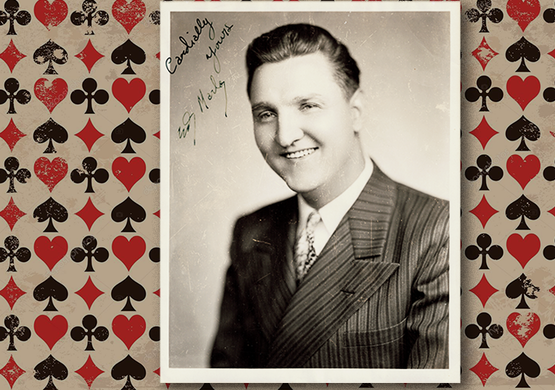On the Passing of Richard Potash, aka Tricky Ricky, aka Ricky Jay
The cheerful ironic distance, the stellar sleight of hand, the palpable intellect behind the sesquipedalian banter—this is the first iteration of Ricky Jay I encountered, on countless television talk shows in the Seventies. A delightful and utterly novel guest on talk shows from Dinah Shore’s to Johnny Carson’s, Jay was already in the midst of a career of opening for rock bands around the country, honing a remarkable array of performance chops under the most challenging conditions imaginable for a man trying to make his living doing card tricks.
As I watch these vintage clips of that early Ricky Jay, I laugh again in recognition of the signature lines that would suit no other performer:
“Well on the way to the luckiest night of my life.”
“I’m not a wealthy man.”
“When I move, I move like lightning.”
Arrayed in a three-piece suit, adorned with his hair reaching down his back, his commentary littered with obscure and arcane references barely decipherable by much of his audience, viewers were held rapt and astonished by the rich combination of all of these forces, swirling around the expert sleight-of-hand magic that lay at the core of it all.
Although we shared many common interests within a small and eccentric community, we did not know one other beyond a couple of brief passing encounters and mutual friends. But I admired and respected much of his work from this side of the footlights, attending his Ricky Jay and His 52 Assistants in each of three different runs, and also enjoying even more his On The Stem, with both shows directed by his friend and colleague David Mamet. Mamet would also put Jay to work as an actor in a number of memorable films, none more so than House of Games, beloved to those of us who share a fascination with con artistry.
I attended an on-stage conversation once between Jay and Mamet, where, in response to a late query in the Q&A, I suddenly apprehended the nature of their deep connection, thanks to an anecdote about a time that the playwright had managed to fool the professional deceiver. Theirs was a special sort of collaboration, between two men who both felt themselves better suited to eras other than the one to which they had been biologically assigned.
I have a particular recollection of a moment watching 52 Assistants in its initial Off Broadway run. In the course of an extended demonstration of cheating techniques during a round of poker, accompanied by members of the audience sitting on stage at the table with him, Ricky was demonstrating the workings of the Bottom Deal—the ability to secretly deal cards from the bottom of the pack. He deliberately and openly positioned the four Aces on the bottom of the deck, and then began to deal the first round of cards for a hand of poker; and then a second round whereupon he turned over his two cards and reveal two Aces. He paused, looked at the audience, and in an earnest deadpan, pronounced: “This is cheating.”
The laugh was huge. And I remember thinking to myself: This is the best kind of laugh a performer can earn. It was not a joke in the sense that it was something anyone else could repeat and thereby garner a laugh. Rather, the laugh was born entirely of character, and situation—and it was one of the biggest laughs of the show. I noted it with admiration.
The countless tributes in the larger world outside magic, plus the heartfelt accolades from within the magic community, from some who knew him and those many who were simply inspired by him, speak volumes about the impact he had—raising the standing of magic, not unlike Robert-Houdin, merely by dint of the work he presented in a lifetime of singular performance. All who take a pack of cards in hand and try to communicate something meaningful through them to an audience owe Ricky Jay a debt of appreciation.
It is easy enough to find his 1993 profile in the New Yorker, or his television special based on 52 Assistants, or his 2012 documentary, Deceptive Practice, not to mention the eleven books he wrote, from Cards as Weapons to Learned Pigs and Fireproof Women, and more. I choose here to provide two vintage clips of that early Ricky Jay whom I first encountered decades ago, when any notion of a life in professional magic was still only a distant future for me. These clips are from the late-Seventies Canadian television series, The Magic Palace, the (near) entire archive of which can be found in The Screening Room.
Here’s to Ricky Jay—wild, weird and wonderful—long may he keep fooling them!
MORE: TAKE TWO ARCHIVE





